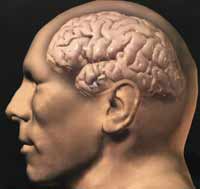Skull size measures human intelligence?
Does a big skull of a human being imply a higher level of his or her intellectual development? Is it true that the blind hear better than the sighted? Why do we often reproduce the same melody in our heads Scientists have found answers to these questions and clarified what is true and what is false.

Truth: you should not tickle yourself
When a doctor examines a patient, he puts the patient’s hand on his hand so that he should not start laughing. Why? The matter is that our brain focuses on what is going on around, and our attempts to tickle ourselves are regarded as internal stimulation with no reaction to follow.
Myth: it is more difficult to look at a picture, than to play cards
A computer has beaten the most famous chess champions. It is hard for a human being to compete with a machine: it makes thousands of various combinations per second. But as soon as a description of some picture or photo is concerned, a computer turns out to be absolutely helpless. It is more difficult for a computer than for a human to concentrate on tiny details. It is quite possible that it will take a cat sitting on a bonnet for a gigantic black mountain.
Myth: we use ten percent of our brain at most
Scientists discovered that the legend concerning Lenin’s unique abilities is not true. Actually, it is not true that other people do not have the same abilities. Experts counted that even during insignificant mental workload there is strain in every brain cell, but this strain is different every time.
Truth: yawning helps us to wake up
We often associate yawning with sleeping, but in fact it helps our organism to obtain more energy. When we put our hand on our wide open mouth, our organism gets rid of unnecessary oxygen and thus stimulates higher speed of life processes.
This human ability is catching. When somebody yawns, the rest do the same. The things are totally different with animals: for instance, dogs’ yawning is a reaction to stress. This is the way they soothe people around and show that nothing terrible is happening.
Myth: the blind hear better
That is not true. Recent research suggested that the blind do not have keener hearing than the sighted. At least they do not hear muffled sounds better than the sighted.
The blinded have better memory. Since they do not have to rely on their sight, they have well-developed logic and spatial reasoning. It means that they can say with their eyes closed where a sugar bowl is or where they have put their keys.
Truth: computer games develop the ability to simultaneously solve several problems
People aged over 30 usually marvel how modern teenagers manage to listen to a CD player, write sms-messages, talk to their friends and do not confuse anything in their mind. It turns out that teenagers train their memory and reaction when they play arcade games and shooters. So maybe, parents should not object to their children’s passion for online computer games.
Myth: a big brainpan means great intelligence
The size of brain does not reflect the amount of grey cells. For instance, Einstein’s brainpan was of the average size.
However, our mental abilities partly depend on when the place between brain cells was formed, or in scientific terms, synapse. As long as the organism is developing, synapses grow and decrease and their final form will affect our intellectual abilities.
Truth: the most difficult thing is to forget stupid haunting songs
There is nothing more irritating than a melody that stuck in your mind. Your brain is to blame, or its ability to sequentially remember things, to be more exact.
From our birth onwards we learn to remember everything sequentially: from the order of letters in our own name up to the route from work to home. We are to be grateful for this brain ability. Unfortunately, there is the reverse of the medal. Sometimes we keep in mind those things we do not want to remember. In this case doctors recommend fighting fire with fire: find some other song and sing it.
Translated by Julia Bulygina
Pravda.ru
Subscribe to Pravda.Ru Telegram channel, Facebook, RSS!




